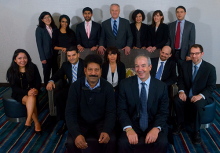
18 February 2015, Southern Poverty Law Center
A federal jury in an SPLC case today awarded $14 million in compensatory and punitive damages to five Indian guest workers who were defrauded and exploited in a labor trafficking scheme engineered by a Gulf Coast marine services company, an immigration lawyer and an Indian labor recruiter who lured hundreds of workers to a Mississippi shipyard with false promises of permanent U.S. residency.
After a four-week trial before U.S. District Judge Susie Morgan, the jury ruled that Signal International, New Orleans lawyer Malvern C. Burnett and India-based recruiter Sachin Dewan engaged in labor trafficking, fraud, racketeering and discrimination. The jury also found that one of the five plaintiffs was a victim of false imprisonment and retaliation.
“The defendants exploited our clients, put their own profits over the lives of these honorable workers, and tried to deny them their day in court,” said lead attorney Alan Howard, Southern Poverty Law Center board chairman and a partner in Crowell & Moring’s New York office. “But they persevered and after seven long years have received the justice they so well deserve.”
The trial was the first in a series of cases spearheaded by the SPLC that together comprise one of the largest labor trafficking cases in U.S. history.
[….]
The workers each paid the labor recruiters and a lawyer between $10,000 and $20,000 or more in recruitment fees and other costs after recruiters promised good jobs, green cards and permanent U.S. residency for them and their families. Most sold property or plunged their families deeply into debt to pay the fees.
When the men arrived at Signal shipyards in Pascagoula, Mississippi, beginning in 2006, they discovered that they wouldn’t receive the green cards or permanent residency that had been promised. Signal also forced them each to pay $1,050 a month to live in isolated, guarded labor camps where as many as 24 men shared a space the size of a double-wide trailer. None of Signal’s non-Indian workers were required to live in the company housing.